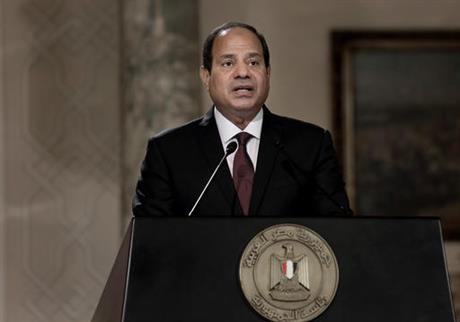
CAIRO (AP) — The International Monetary Fund said Thursday it will grant Egypt a $12 billion loan over three years to help the Arab world’s most populous country mend its ailing economy following years of unrest.
The IMF said the loan, which is subject to approval by its executive board, comes in support of a government reform program that aims to stabilize Egypt’s currency, reduce the budget deficit and government debt, as well as boost growth and create jobs.
“Egypt is a strong country with great potential but it has some problems that need to be fixed urgently,” it said in a statement, adding that planned government measures include tax increases and cuts in energy subsidies. Egypt said earlier this week it would raise electricity prices by a least a quarter, part of plans to eliminate the subsidies altogether by 2019.
Egypt’s economy has been struggling since the 2011 uprising that overthrew longtime autocrat Hosni Mubarak, with high inflation, foreign currency shortages, and lack of tourism and investment.
Egypt hopes the loans can generate momentum that will boost growth and reassure potential investors.
The government’s economic program says it will focus on helping the poor, and try to ensure that any economic rebound brings benefits to the entire population of 91 million and not just elites, as has happened during past periods of economic growth.
Egyptian President Abdel-Fattah el-Sissi has faced mounting criticism of his economic stewardship in recent months, and has responded with near daily appearances and statements touting his commitment to defending the poor.
Egyptian leaders have balked at IMF loans in the past because they require subsidy cuts and other reforms that cause short-term pain, and which could spark popular unrest. Frustrations over economic stagnation, inequality and perceived corruption were among the main factors behind the uprising that toppled Mubarak in 2011 and the massive protests demanding the resignation of Islamist President Mohammed Morsi in 2013.
El-Sissi, who led the military overthrow of Morsi that year, has presided over a wide-ranging crackdown on dissent that has virtually eliminated street protests.
While the IMF cast Thursday’s deal as supporting the government’s own home-grown reform package, the lender is widely expected to have demanded the floating of the country’s overvalued currency.
Egypt’s foreign currency shortage has generated a thriving black market for U.S. dollars and hindered the operations of multi-national companies. Despite a rising dollar, the central bank has resisted devaluation, spending billions of dollars of its own cash reserves to prop up the Egyptian pound, and only allowing a slight devaluation last year.
The lack of foreign currency has been compounded by a drop in tourism revenues in the wake of recent terrorist attacks. Egypt has also seen dwindling revenues from the Suez Canal because of a falloff in foreign trade, despite a costly and much-hyped expansion of the key trading channel linking the Mediterranean to the Red Sea.
The Egyptian pound now trades about a third weaker than its official value of 8.9 to the dollar. Before Thursday’s deal, Central Bank Governor Tarek Amer said that defending the pound had been a “grave error.” Documents leaked to the press showed the bank blaming the government for forcing it to do so.











